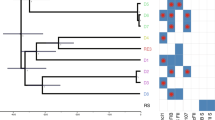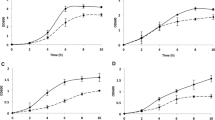Abstract
VIEWS have recently been expressed that some aspects of genetic engineering research should not be allowed to continue because of their possible dangers to human health1,2. For example, objection has been taken to the laboratory practice of incorporating genetic regions of foreign DNA in bacterial plasmids and introducing them into organisms whose normal habitat is the alimentary tract, because such organisms may accidentally gain access to the alimentary tract of man, colonise it and/or transmit the plasmids during conjugation to the resident intestinal flora. Consequently, we have investigated this matter in regard to Escherichia coli K12, the intestinal organism most frequently used as the recipient of plasmids into which foreign DNA is incorporated, using a human volunteer in whose alimentary tract transfer of plasmids coding for antibiotic resistance (R factors) had previously been demonstrated following the consumption of wild strains of antibiotic-resistant E. coli3. Even when much higher concentrations of E. coli K12 organisms than would be expected to be accidentally consumed in a laboratory were taken, they did not colonise the alimentary tract but organisms of some strains survived better than others; no evidence of transfer of plasmids from these K12 organisms to the resident E. coli of the alimentary tract was found.
This is a preview of subscription content, access via your institution
Access options
Subscribe to this journal
Receive 51 print issues and online access
$199.00 per year
only $3.90 per issue
Buy this article
- Purchase on Springer Link
- Instant access to full article PDF
Prices may be subject to local taxes which are calculated during checkout
Similar content being viewed by others
References
Science, 185, 332 (1974).
Nature, 250, 175 (1974).
Smith, H. W., Lancet, i, 1174 (1969).
Lederberg, J., Cavalli, L. L., and Lederberg, E. M., Genetics, 37, 720 (1952),
Hayes, W., J. gen. Microbiol., 8, 72 (1953).
Hardy, K. G., Meynell, G. G., Dowman, J. E., and Spratt, B. G., Molec. gen. Genet., 125, 217 (1973).
Smith, H. W., and Heller, E. D., J. gen. Microbiol., 78, 89 (1973).
Miles, A. A., and Misra, S. S., J. Hyg., Camb., 38, 732 (1938).
Smith, H. W., J. med. Microbiol., 3, 165 (1970).
Wiedemann, B., Knothe, H., and Doll, E., Zentbl. Bakt., I. Orig., 213, 183 (1970).
Anderson, J. D., Gillespie, W. A., and Richmond, M. H., J. med. Microbiol., 6, 461 (1973).
Ingram, L. C., Anderson, J. D., Arrand, J. E., and Richmond, M. H., J. med. Microbiol., 7, 251 (1974).
Author information
Authors and Affiliations
Rights and permissions
About this article
Cite this article
SMITH, H. Survival of orally administered E. coli K12 in alimentary tract of man. Nature 255, 500–502 (1975). https://doi.org/10.1038/255500a0
Received:
Accepted:
Issue Date:
DOI: https://doi.org/10.1038/255500a0
This article is cited by
-
Barriers to coliphage infection of commensal intestinal flora of laboratory mice
Virology Journal (2005)
-
Fate in sewage of a recombinantEscherichia coli K-12 strain used in the commercial production of bovine somatotropin
Journal of Industrial Microbiology (1993)
-
Escherichia coli K12 does not colonize the gastrointestinal tract of Fischer-344 rats
Journal of Industrial Microbiology (1993)
-
Absence of persistence and transfer of genetic material by recombinantEscherichia coli in conventional, antibiotic-treated mice
Journal of Industrial Microbiology (1993)
-
Survival ofLactobacillus species (strain GG) in human gastrointestinal tract
Digestive Diseases and Sciences (1992)
Comments
By submitting a comment you agree to abide by our Terms and Community Guidelines. If you find something abusive or that does not comply with our terms or guidelines please flag it as inappropriate.



